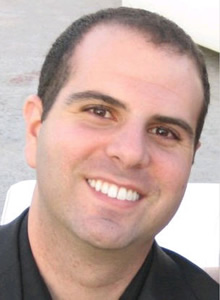
Jason Nazar from Docstoc has created a site where any type of document can be uploaded or downloaded for free. You’ve probably seen the docstoc viewer on techcrunch.
It sounds kind of uninteresting until you realise that the documents get a lot of search traffic (eg people looking for mortgage forms, legal forms, etc) and that they become a perfect tool for lead generation. If you’re interested in working with Jason as a lead provider, drop me a line and I’ll put you in touch.
Full Interview Audio and Transcript
Personal Info
Hobbies and Interests: Playing basketball and tennis, playing the piano, superhero cartoons, and classic movies.
Favourite Sports Teams: LA Lakers, LA Dodgers.
Favourite Books:
- Authors: Ayn Rand, Thomas Friedman, business self help
- Think and Grow Rich by Napoleon Hill
- How to Win Friends & Influence People by Dale Carnegie
Favourite Entrepreneurs: Matt Coffin, Michael Jones, Kamran Pourzanjani.
Twitter url: http://twitter.com/jasonnazar
Personal blog: http://jasonnazar.com
Company Website: http://docstoc.com
Fast Track Interview
Adrian Bye: I’m here with Jason Nazar. He is the CEO of Docstoc, a site doing lead-generation through providing free documents and templates. It’s an interesting model I’ve never heard of that actually sounds pretty smart. Before we talk about Docstoc, Jason why don’t you tell us a little bit about who you are and where you come from.
Jason Nazar: Sure. I’m an LA native. I went to college in Santa Barbara, and I have an MBA in law from Pepperdine in Southern California. I’m a serial entrepreneur. Docstoc is the third company I’ve started and the first one on the Web.
I started my first company out of college. For about two years, I went around the country doing motivational speaking to high school and college students in addition to corporate sales training and communication seminars. After that, I was the Director of Marketing and Sales at a non-tech start-up in Southern California.
While I was going through grad school, I started a consulting company with one of my classmates, Michael Sheridan. We were consulting for start-ups and small businesses in the Los Angeles area. That’s really where I got the idea for Docstoc, which had its one-year birthday on October 30, 2008.
I would spend hours a day looking for documents online. I built this really great repository of digital documents on my own personal computer. One night at 1:00 a.m., I thought to myself, “It’s really hard to find quality documents. There should be something like YouTube or Flickr for documents.”
 I wanted to build a place where anybody could get any document fast, easy and for free. I started self-financing Docstoc when I was a student in law school and working by myself. Then I met Alon Shwartz; soon afterwards he came on as our CTO and the cofounder of Docstoc. I maxed out my credit cards, took out some student loans, and used all the money I had saved, which wasn’t a lot. I basically tried to build Docstoc with a firm in India. Then to continue it, I raised an angel round of capital as I finished law school.
I wanted to build a place where anybody could get any document fast, easy and for free. I started self-financing Docstoc when I was a student in law school and working by myself. Then I met Alon Shwartz; soon afterwards he came on as our CTO and the cofounder of Docstoc. I maxed out my credit cards, took out some student loans, and used all the money I had saved, which wasn’t a lot. I basically tried to build Docstoc with a firm in India. Then to continue it, I raised an angel round of capital as I finished law school.
We are backed by the venture capital firm Rustic Canyon and have a lot of great investors from the LA community including Brett Brewer from Intermix which is the parent company of MySpace, Kamran Pourzanjani from PriceGrabber, Matt Coffin from LowerMyBills, and Robin Richards from MP3.com. Michael Jones who sold Userplane to AOL is also one of our board members.
We now have over 2 million unique visitors a month and are getting close to 10 million page views a month.
Adrian Bye: What’s your opinion of the LA tech scene?
Jason Nazar: By pure numbers, over the last year or two Los Angeles has been the fastest-growing segment of venture investment. There’s a really burgeoning tech community down here. It’s obviously different than the Bay, which is all about “the tech community” and Web 2.0 sites.
What you find is a lot of folks here focus more on money and business, and a little bit less on product and user experience. Folks in the Bay focus more on product, user experience, getting traffic and reaching a critical mass with a little less focus on making money. There’s a lot to learn from both, honestly.
Adrian Bye: How does Doctsoc actually work?
Jason Nazar: Our goal is to build the largest repository of professional and productivity documents anywhere. The value proposition is that you can get any legal, business, financial, educational, or creative document you need fast, easy and for free.
Conceptually, it’s similar to YouTube in that it’s user-generated content. People all over the world upload their Word, Excel, PowerPoint and PDF files. You can preview all those documents on our site, and then you can download them.
The way we monetise this is that we have a lot of professional content so we’re good at capturing what somebody’s intent is. If somebody comes to our site and looks for an LLC operating agreement, a partnership agreement, an invoice template or a set of financials, we know a lot about what’s going on in that person’s life and what they’re looking for.
There’s the opportunity to have really targeted advertising against those documents as well as do lead-generation. We’ve spent most of the first year trying to build a good product with our revenue model in mind and grow the traffic. Now that those two things are going pretty well, we’ve refocused our attention to developing a successful lead-generation model.
Adrian Bye: Let’s say I’m looking at a document on how to form an LLC. How do you capture my information, pass that on as a lead, and sell it?
Jason Nazar: We’re working on integrating that aspect now, and it will be on the site in the first of the year. I’ll also defer your question because it is a little confidential in how it will work.
Adrian Bye: Do you become a repository for sites that are being promoted on Digg? Do you then have to deal with the Digg effect?
Jason Nazar: Yes, we’ve been on the front page of Digg a lot. I’m a really active Digg user myself and have gone there for years to read and get alternative sources of news. A lot of our content has been highlighted not only on Digg but on reddit, StumbleUpon and other sites.
Because we’re a content aggregator and we deal in so many different topics, not just legal, business and financial, our content has a way of finding itself all over the Web. We also get a lot of people linking to us from blogs, and our content also gets promoted on social media.
 A lot of sites even use us to embed documents. Instead of having a link to say, “Click here to see this PDF or this press release,” you can preview that document right on your site. It’s an interesting better-viewing experience for users, and a lot of times it’s a better way to share or promote documents.
A lot of sites even use us to embed documents. Instead of having a link to say, “Click here to see this PDF or this press release,” you can preview that document right on your site. It’s an interesting better-viewing experience for users, and a lot of times it’s a better way to share or promote documents.
If you go to TechCrunch, Huffington Post or Chicago Tribune, they will take documents that are on our site. For example, Huffington Post ran a story on the Senate Bailout Bill that came out with the proposed bill for the United States Congress to bail out $700 billion for private industry, and they embedded the Bailout Bill using Docstoc.
Adrian Bye: How do you get your traffic? If you’re 2 million uniques a month, how did you start from nothing to get to that?
Jason Nazar: We basically get traffic from people who come directly to the site. We get traffic from a lot of referral sites and blogs that link back to us. For example, one of our documents is embedded in a TechCrunch post that Erick Schonfeld wrote about whether iPhones are better than BlackBerrys. People see that, and they click through to our site.
A lot of our traffic also comes from natural search as our documents get indexed in search engines. For example if you go to Google and type in LLC operating agreement, we’re the first natural result, not paid result.
Adrian Bye: Are you tied into the Digg network where guys are communicating quite a lot about stories and working to get content up to the front page?
Jason Nazar: I’m tied into a lot of networks and social sites. Some people make model airplanes. Other people play basketball, and others go to movies; it’s what you enjoy doing. It’s not the totality of what I do in my free time. The fact is that I am an Internet geek, and I really enjoy diving into other people’s products.
It also gives me a better sense of what builds a good product and a good community. It’s a little hypocritical if I’m asking people to get engaged and use the Docstoc experience if I’m not doing anything like that on the Web myself.
Adrian Bye: Have your ties and connections into the traffic-driving community helped you grow your company?
Jason Nazar: Sure. The day Docstoc went live a piece of our content made the front page of Digg. Our site was shut down for 20 minutes because of that. All of a sudden a lot of people saw this site that nobody else had. Right now, Digg is not a really significant portion of our traffic anymore.
The fact that you’re tapped into a social media community and into people who are evangelisers on the Web and blogs, use social media sites, and get the word out virally is really a big deal. When you first start and don’t have a budget, you are trying to figure out how to get people to know about you. I really threw myself into figuring out how people drive traffic on the Web to get as many people knowing about Docstoc as possible.
Adrian Bye: Why do you do that and not have four people on your team focused on doing that?
Jason Nazar: I enjoy spending some of my incremental free time at 1 or 2 in the morning, when I’m blurry-eyed from doing work, just playing on Internet sites. It’s also like anything else where you’ve got to do it for the right reasons. If you go on a social site and your only goal is to promote yourself, people figure out your intentions. People are smart and catch on whether it’s in person, over the phone, on IM or in chat. Maybe one time, you can get one story to do well in one social network, but it’s not sustainable over time. My approach is that I like these communities, I like these people, I want to promote Docstoc, and I don’t see any of them as antithetical to each other.
Adrian Bye: Within these communities, do they ever say to you, “You’re asking me to promote this Docstoc story again, but you are the CEO and you’ve obviously got a vested interest in this. We’re doing this for free, and we’re not getting paid. But you’ve got financial incentive here so I can’t promote it.”
Jason Nazar: I can honestly tell you I haven’t got that reaction that much. Forget that it is social Web. If you’re always trying to promote yourself and you never try to help other people with their issues or your only interest is in trying to promote yourself, you’re the guy everyone wants to stay away from.
Here is what I do when I’m on Digg or different social sites. I’ll see different people submit stories. Since I like their content, I’ll probably pay more attention to it and check it. Every once in awhile, somebody will send me an e-mail saying “I thought this was a cool story,” or they’ll shoot me an IM. If I think it’s a cool, interesting story and it adds value to the community, I’ll look at it if I have time.
Adrian Bye: Let’s say you had a story you wanted to promote. Let’s assume that it’s not Docstoc-related. How many people are you talking to about that? Are you e-mailing them? Are you using IM with them? How does that actually work?
 Jason Nazar: When we first launched, I put in one or two things and then drilled on. For what you’re saying, I don’t really submit Docstoc stuff. If people know me and promote my story because they like me personally or they like the company, that’s great. Any help or notoriety that anyone wants to do, I’m very thankful for it, but I don’t put in my own stuff into social media. I just kind of draw the line there. There’s also a little fact that I’ve got a company to run. There are 13 or 14 employees here. I don’t really spend most of my time doing those things.
Jason Nazar: When we first launched, I put in one or two things and then drilled on. For what you’re saying, I don’t really submit Docstoc stuff. If people know me and promote my story because they like me personally or they like the company, that’s great. Any help or notoriety that anyone wants to do, I’m very thankful for it, but I don’t put in my own stuff into social media. I just kind of draw the line there. There’s also a little fact that I’ve got a company to run. There are 13 or 14 employees here. I don’t really spend most of my time doing those things.
Adrian Bye: I don’t understand then. How are the relationships you have with the Diggs, the reddits and the other communities helping promote Docstoc? Is it just because they know who you are and give you an extra bump?
Jason Nazar: Yes, probably. This isn’t the stuff that I do during the business day. Late in the night when other people are going out, drinking, or partying, I’m here in the office and playing around with those communities.
A lot of times I’ll take those hours to surf the Web and look for other people’s blogs. I’ll leave comments on their blogs, share their posts with others I know or I’ll reblog on my blog about what they’re doing. People will take notice, be thankful, and check out what you do. The fact is also that people will link back to Docstoc because they see me as an active blogger.
Adrian Bye: Is it then almost more about brand recognition and knowing who you are?
Jason Nazar: I think a lot of it is authenticity. People take to other people that are good folks and try to help them out. Honestly, I don’t claim to be the smartest or the best CEO. What I can say is I genuinely try to help out whomever I can when I can. I’m not always successful at it, but whether it’s my employees here in the office, people asking me for advice on how to raise money or start a business, or it’s a 15-year old kid that asks me over chat to read some article he wrote, I’m generally trying to be a nice guy.
If you try to be nice and good to most people, it’s eventually a better way to live. You’re happier and it probably comes back on the end. Whether it’s in social media, on the blogosphere, or in trying to raise money, if you’re down-to-earth, humble, and tell people what you think you can and can’t do, it’s not necessarily always going to get what you want but people respond to you a whole lot better.
Adrian Bye: We talked about a lot of stuff. Is there anything that we haven’t talked about that you want to tell us?
Jason Nazar: We really try to make it as easy as possible to help get your documents online. Think of all the valuable documents you have on your computer. A lot of people ask, “Why would I want to share my documents?” People share their documents because they want to promote their content, they want to promote their business, service or Web site, and they want to contribute to a larger repository. Billions and billions of invaluable assets live and are hidden in Word, Excel, PowerPoint, and PDF documents. They’re trapped on all these computers, and we’re trying to free it all up.









